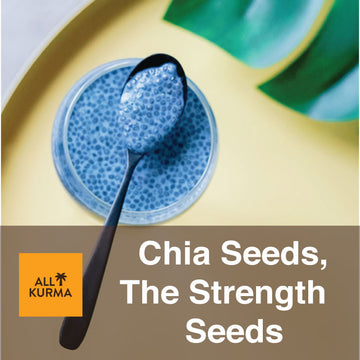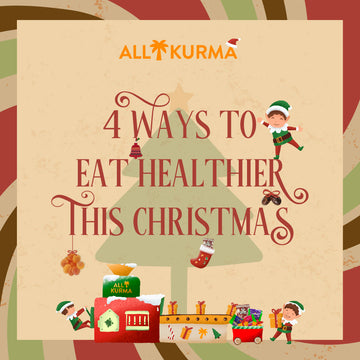If you have been following the food trend closely, you will notice that Chia seeds are among the most consumed food, and are in fact it also known as a nutritional powerhouse in Superfood, which offers a good array of health benefits.
What are Chia seeds?
Chia seeds are small, flat and ovular, shiny and smooth in texture, with a colour ranging from white to brownish black.
Chia is an edible seed originating from the desert plant Salvia Hispanica, grown in the native region of Mexico and Guatemala dating back to Mayan and Aztec cultures. The Mayan word "Chia" itself means strength, and folklore has it the ancient Aztec and Mayan cultures used the tiny black and white seeds as an energy booster, which is where the name Chia is derived from.
The Chia Anatomy
Chia seeds are an unprocessed, whole-grain food that can be absorbed by the body as seeds (unlike flaxseeds).
One major reason people love Chia seeds is because they're highly nutritious. They don't have a specific kind of taste, but what they do have is a concentrated amount of healthy omega-3 fatty acids, carbohydrates, protein, fibre and other micronutrients.
Dried Chia seeds contain 6% water, 42% carbohydrates, 16% protein, and 31% fat. Every 100-grams of Chia seeds contains a rich source of B vitamins, thiamine and niacin, and a moderate source of riboflavin and folate. Several dietary minerals found in Chia are Calcium, Iron, Magnesium, Manganese, Phosphorus and Zinc.
To be more specific, one ounce (about 2 tablespoons) contains 4 grams of protein, 9 grams of fat, 12 grams of carbohydrates and 11 grams of fibre, plus vitamins and minerals.
Now thanks to their excellent nutrient profile, Chia seeds have been associated with many health benefits.

Why should we Chia
The tiny Chia seeds are one of the most nutritious Superfoods as it contains a large amount of healthy Omega-3 fatty acids and dietary fibre that helps reduce the risk of heart disease.
If you eat them in moderation, Chia seeds can be an excellent addition to a healthy and balanced diet.
Consuming 1 ounce (28 grams) of Chia seeds is sufficient to provide up to 42% of your recommended daily intake of fibre and hearty doses of phosphorus, magnesium, calcium and omega-3 fatty acids.
The calcium content is 18% of the RDI in a single ounce (28 grams), making it gram-for-gram higher than most dairy products. As a result, Chia seeds may be considered a perfect alternative source of calcium for vegans and people who don't or can't eat dairy.
Chia seeds are also rich in antioxidants, which are compounds that provide protection from oxidative stress, and reduce the risk of chronic disease.
They are well known in fighting the production of free radicals, which can damage cell molecules and contribute to aging and diseases like cancer.

To Chia or not to Chia
Chia seeds are highly nutritious with a long list of health benefits and can be a healthy dietary addition for most.
Moderation is key when you are indulging in any Superfood. The important point to note is, Chia seeds swell up and absorb 10-12 times their weight in liquid when they are exposed to water so soak them preferably, for 5-10 minutes before consuming. Children and those with difficulty swallowing need to take extra caution when consuming Chia. .
Chia seeds are safe for most people, however, manage your intake if you are on any blood sugar or blood pressure medications. With its high content of fibre, Chia seeds are extremely effective in slowing down sugar absorption which in turn will lower your sugar level.
Another aspect of Chia is in its omega-3 fatty acids. If it's taken regularly it will act as a natural blood thinner that may decrease your blood pressure.
To prevent this, start with 1 ounce (28 grams) daily to assess your tolerance before slowly increasing your intake.
Enjoy Chia seeds for their flavour and to boost the fibre, protein, calcium, antioxidants, and omega-3s in your diet and have fun by adding them into your drinks, smoothies, breakfast oats or your culinary adventure.
Source:
https://www.healthline.com/nutrition/11-proven-health-benefits-of-chia-seeds
https://www.medicalnewstoday.com/articles/291334
https://www.webmd.com/diet/features/truth-about-chia#1
https://www.healthline.com/nutrition/chia-seeds-side-effects






